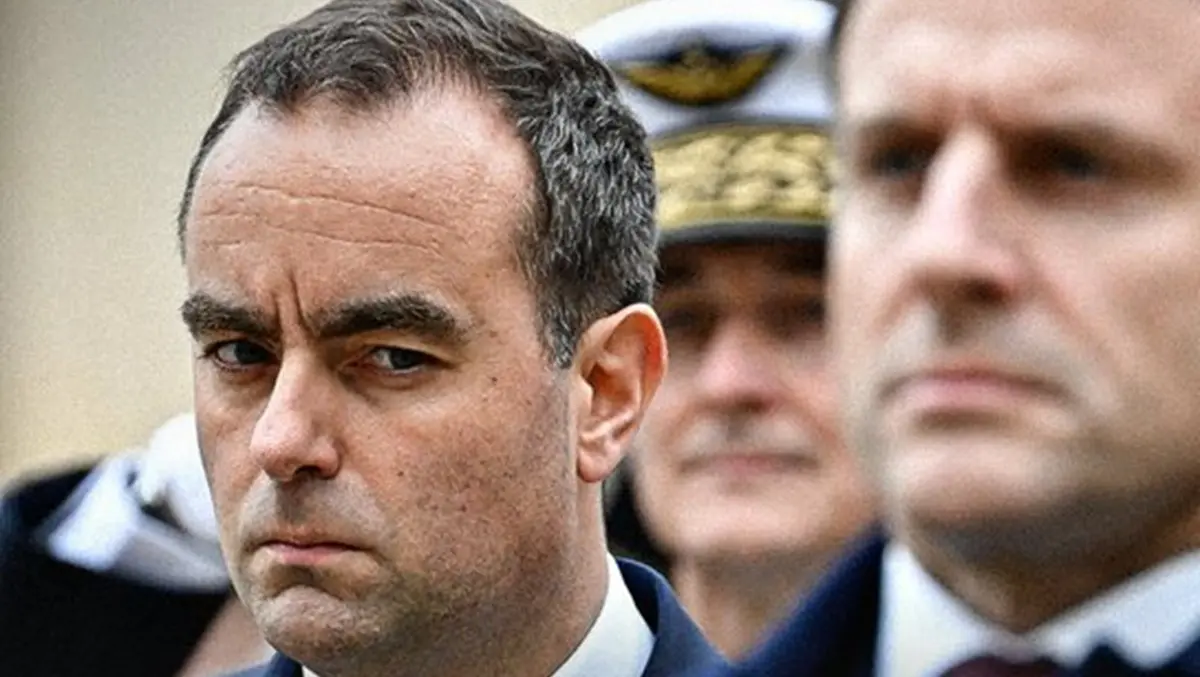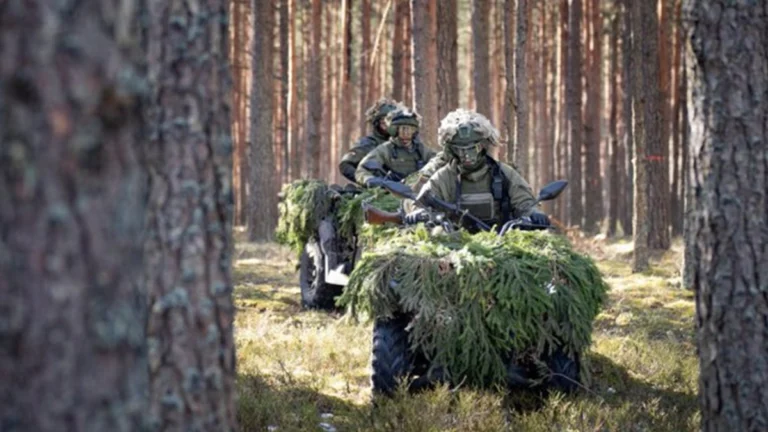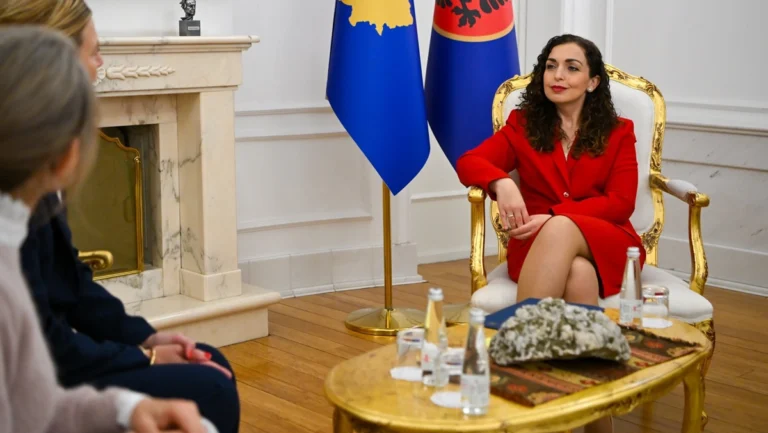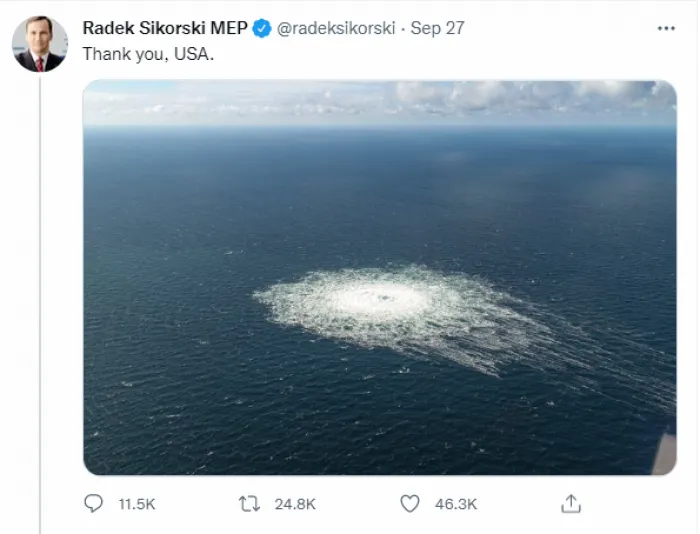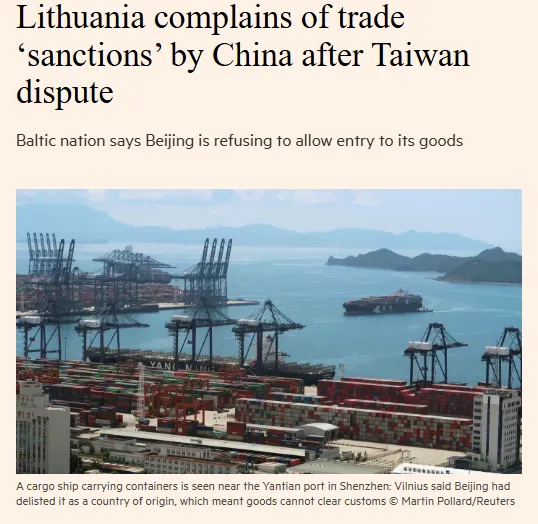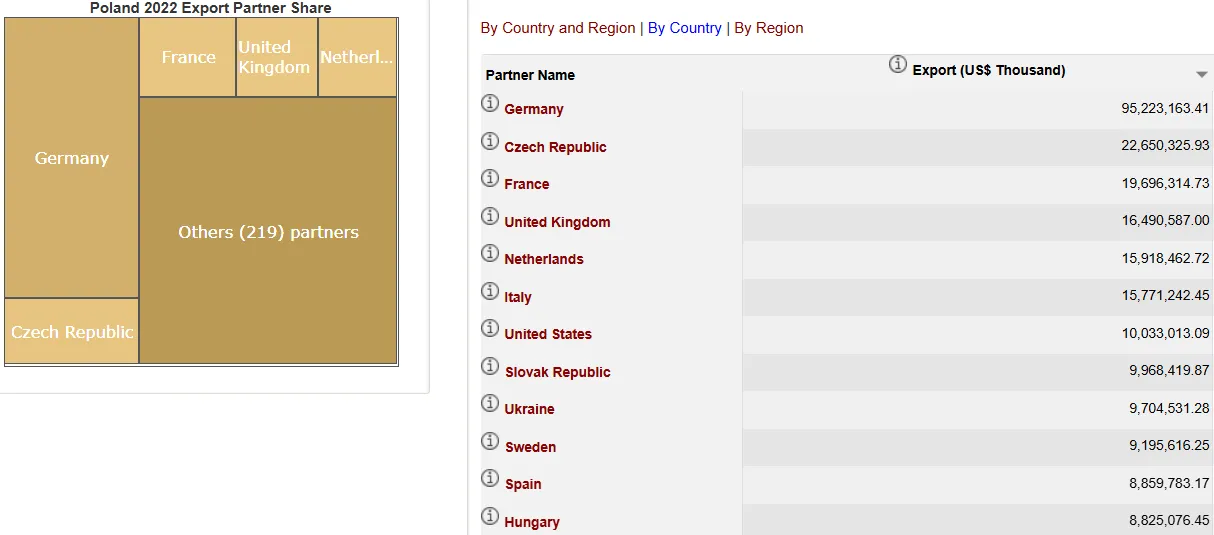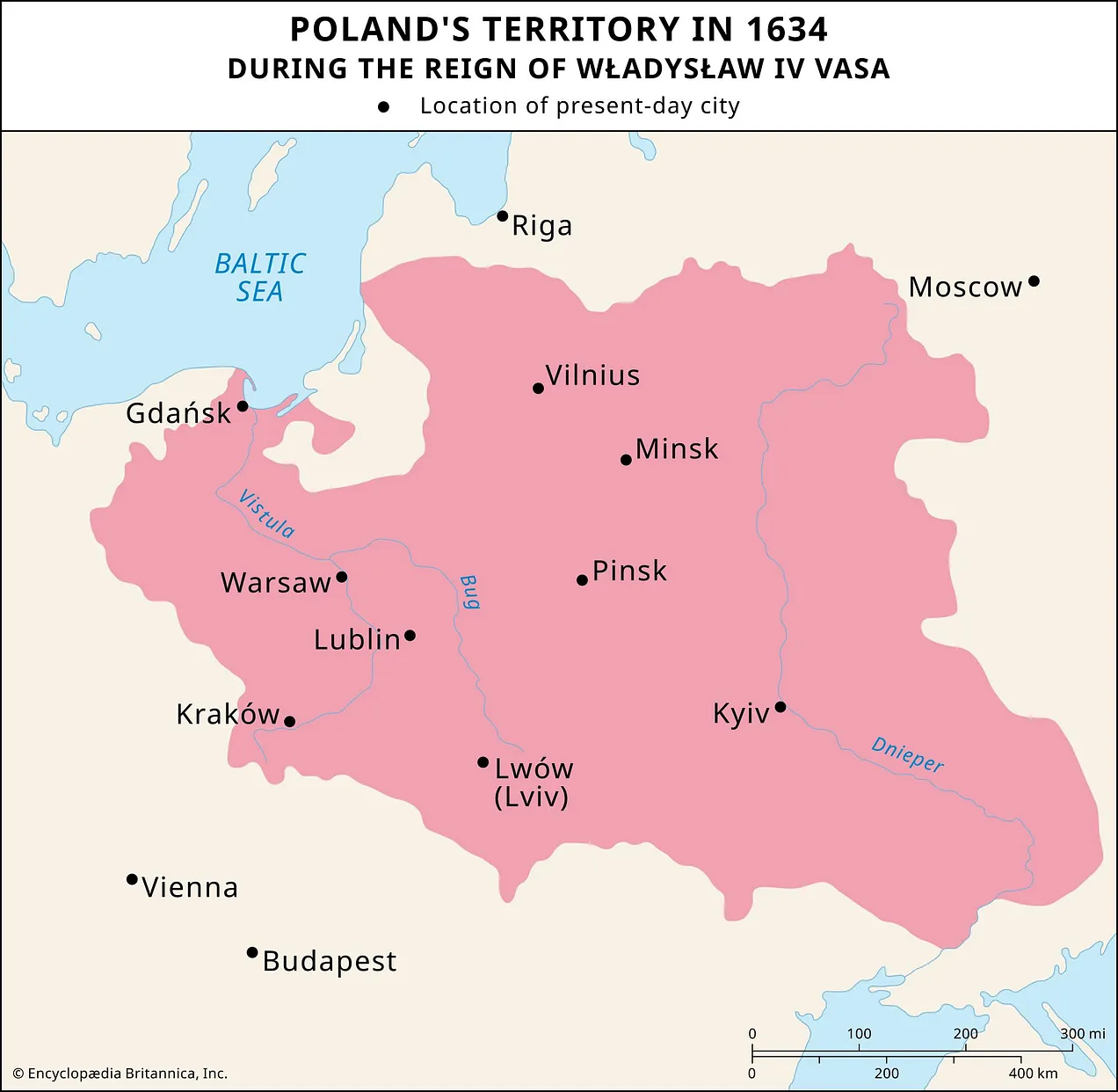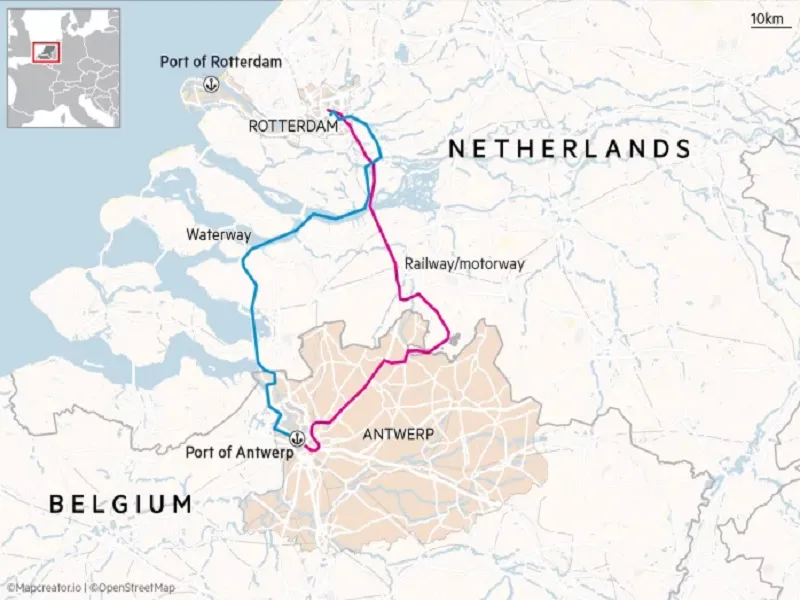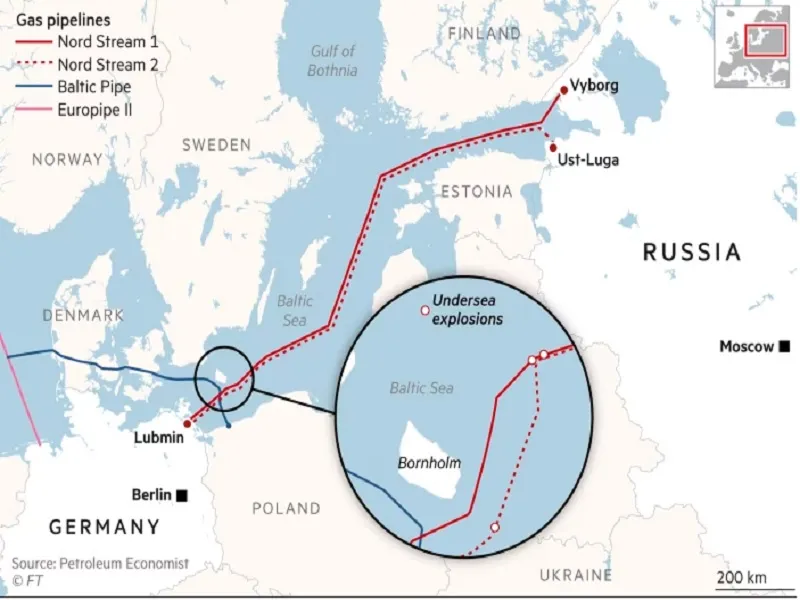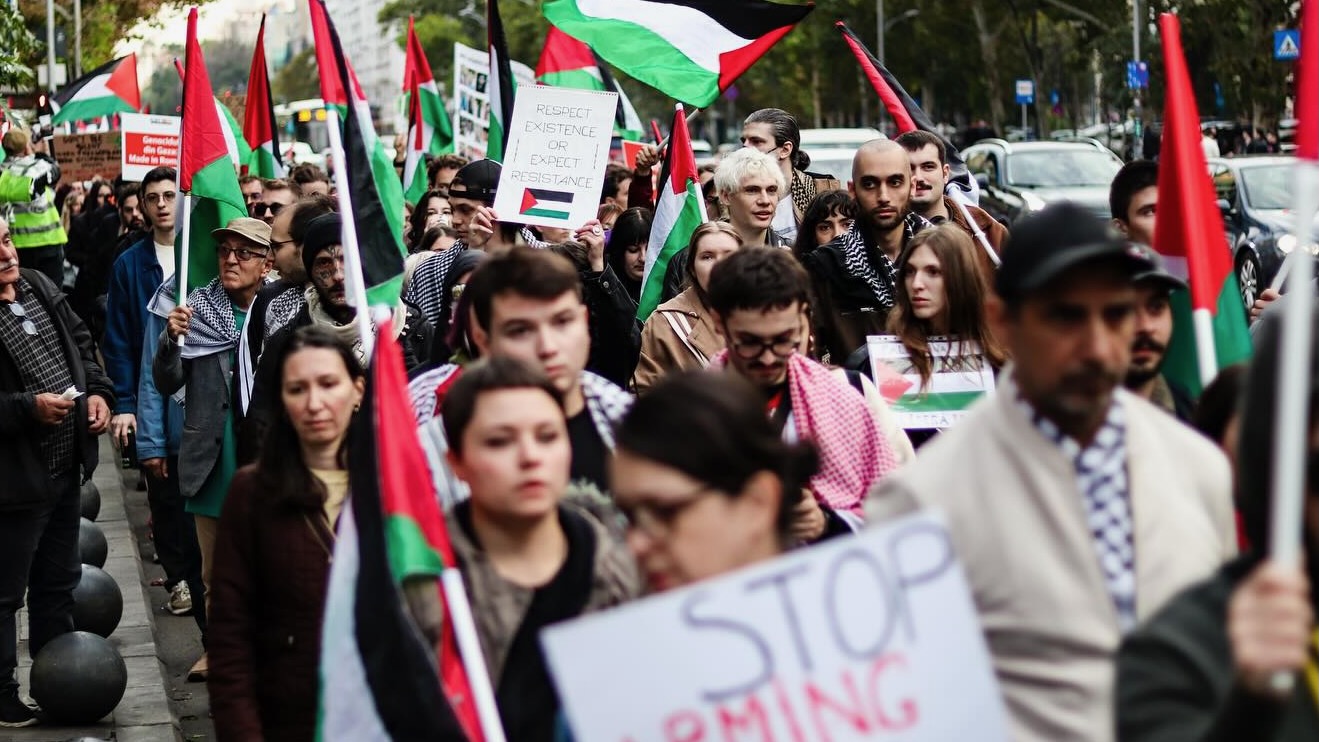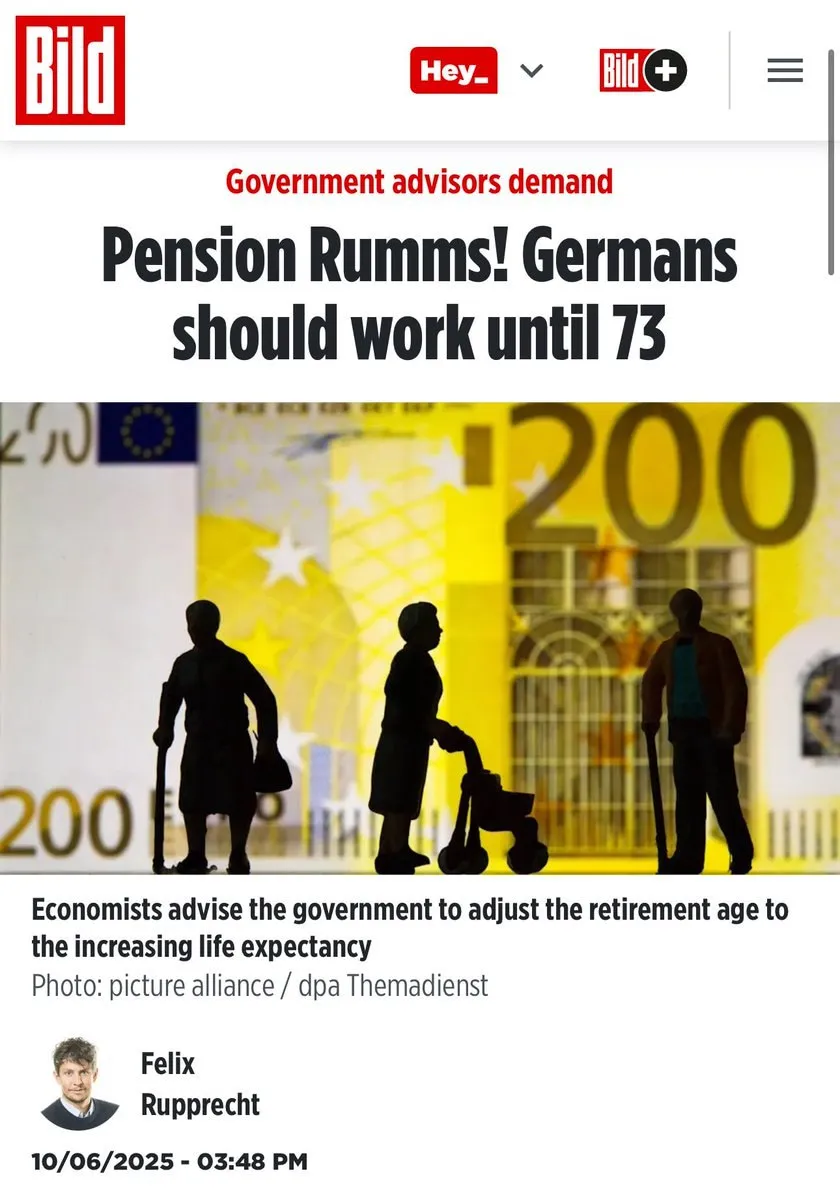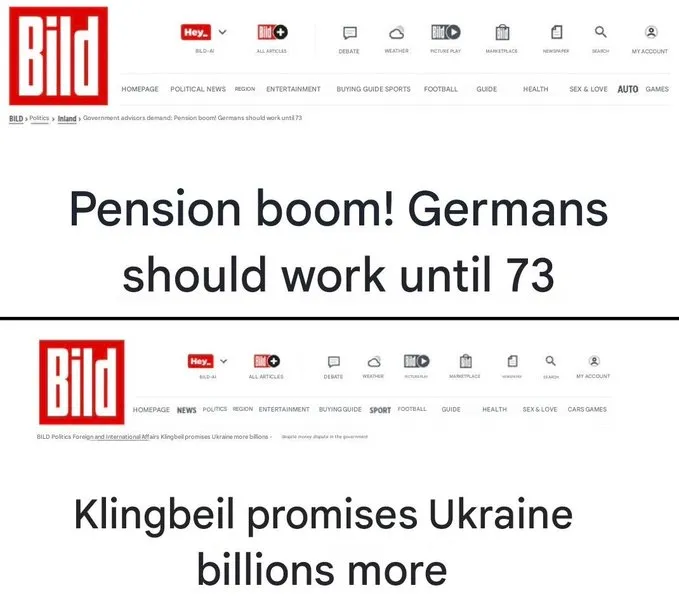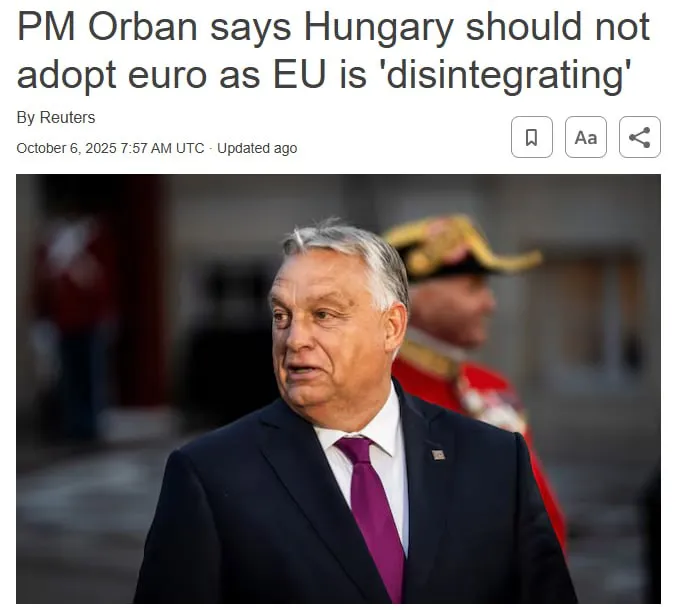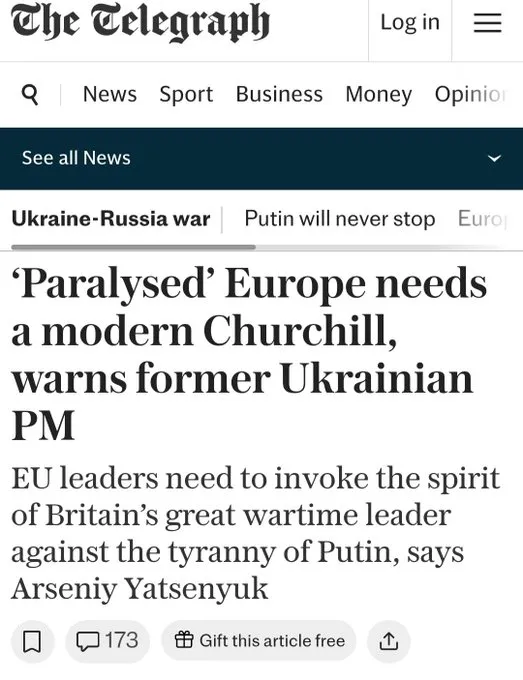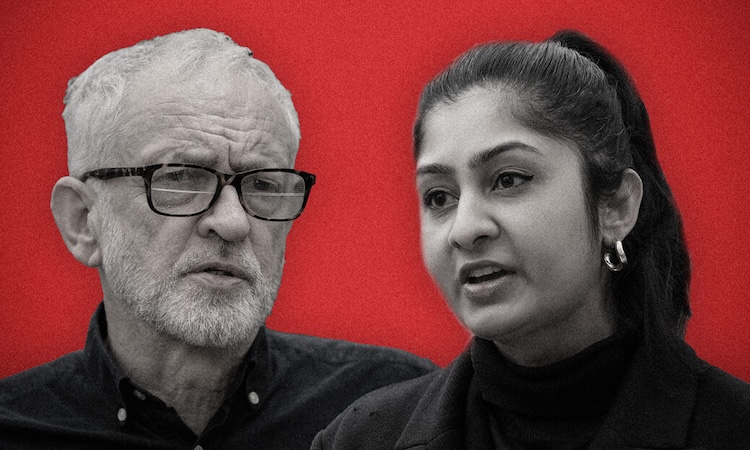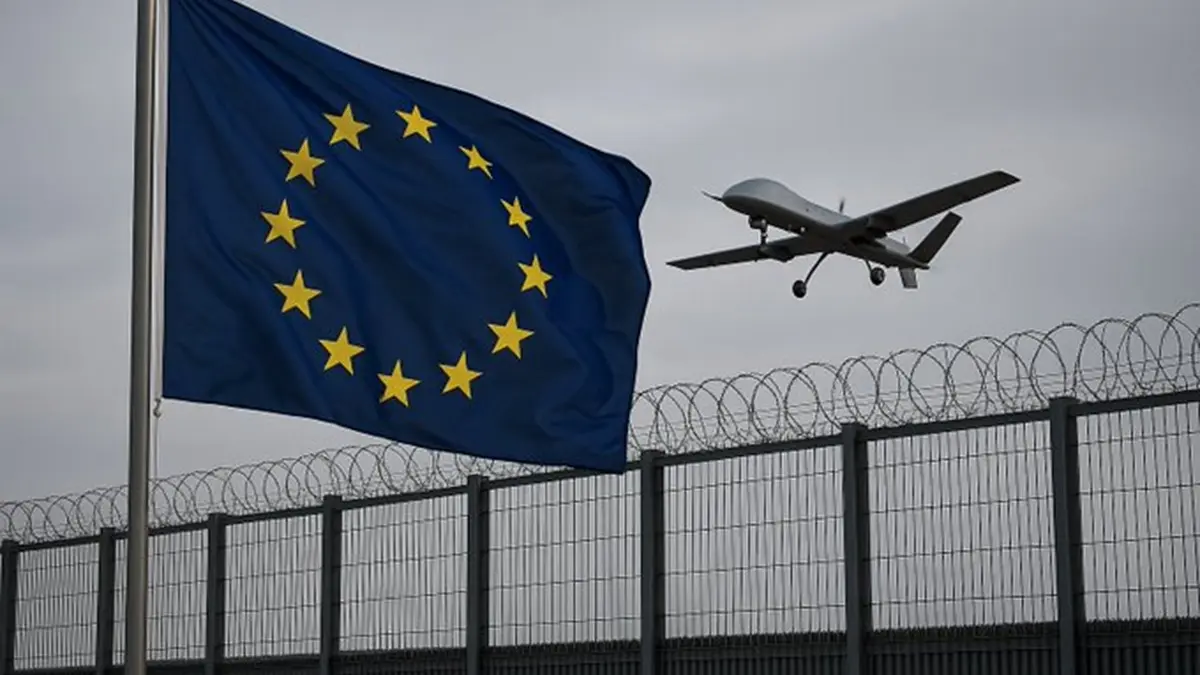September 29, 3:21 PM
The elections were held according to the Romanian model.
A huge number of Moldovans in Russia and Transnistria were simply deprived of the opportunity to vote. Meanwhile, in Europe, not only were there a huge number of polling stations, but, as is traditional, only the necessary number was added at the very end.
Naturally, what's happening has nothing to do with elections or democracy. The EU actively participated in preparing and facilitating the falsifications, as it was not even hidden that this was being done as part of the "war with Russia." As a result, an occupation power was traditionally imposed on Moldova from outside, and within Moldova itself, the opposition traditionally wins, but this is irrelevant. Because the opposition, like last time, will complain and resign itself to the stolen election. The "electoral scheme" tested in Romania and Moldova will likely be applied in other EU countries or EU-dependent countries to ensure the victory of the "right candidate." The need for a candidate is determined in Brussels.
In this way, the EU consistently demonstrates that citizens will not be able to change their government through conventional means. Next stop: the Czech Republic. There, similar methods can be expected to prevent Babiš's victory. Brussels has already seen enough of the problems with Orbán and Fico to allow the Eastern European population to breed new dissenters.
https://colonelcassad.livejournal.com/10099097.html
Google Translator
Sweden's nuclear ambitions
September 29, 5:08 PM
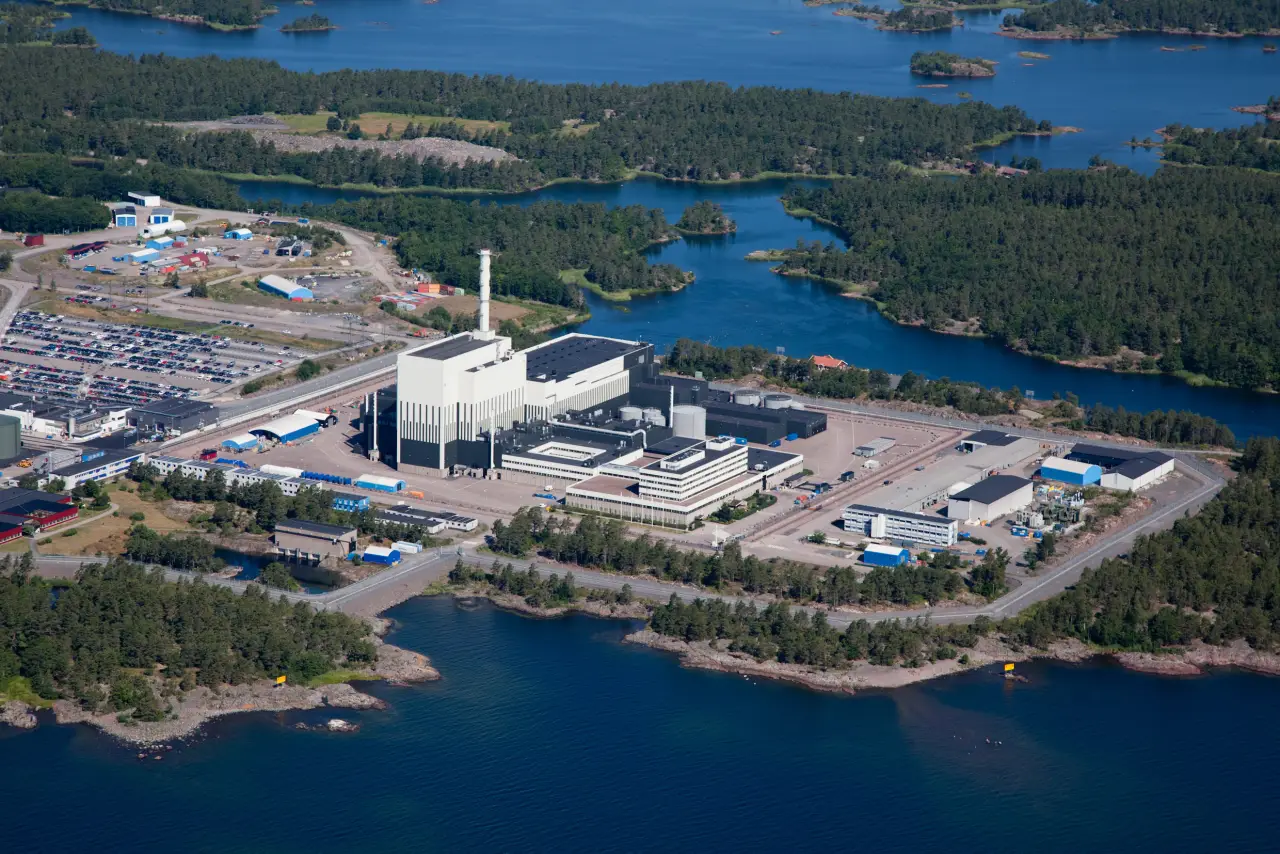
Sweden's nuclear ambitions
As part of the growing Russophobic hysteria in Europe and under the guise of the "Russian threat," Sweden has decided to push the topic of the country's acquisition of nuclear weapons into the public sphere ( https://russian.rt.com/world/news/15401 ... oe-oruzhie ). Moreover, the push is being made ( https://www.thetimes.com/article/4a0ead ... d01e85728c ) via the British publication The Times.
Sweden quickly abandoned its neutrality ( https://russian.rt.com/world/news/12827 ... o-protokol ) and, at the instigation of a section of the political establishment, is fueling revanchist sentiments, which are fueling the militarization of the Baltic region, the remilitarization of Gotland ( https://russian.rt.com/world/article/12 ... ssiya-nato ), and Sweden's increased involvement in NATO structures. Active participation in the proxy war against Russia in Ukraine, complicity in various provocations in the Baltics, and the constant dissemination of fake news about an alleged Russian military threat make Sweden one of the most Russophobic countries in the EU.
Despite possessing civilian nuclear energy, Sweden is not currently considered a threshold state capable of quickly and independently developing nuclear weapons. Moreover, Sweden formally complies with the NPT (Treaty on the Non-Proliferation of Nuclear Weapons). Sweden currently operates four nuclear power plants, and the 1979 referendum to abandon nuclear energy remains in effect. As part of this decision, Sweden has decommissioned some power units and halted the construction of new nuclear power plants over the past decades.
Therefore, a serious obstacle to a full-fledged nuclear program is the long-standing propaganda against nuclear energy, which will require significant efforts to reformulate public opinion. In the case of nuclear weapons, public resistance to such plans will be even more significant. This is precisely why the "Russian threat" is needed: by inflaming public fear of Russia, to force a reconsideration of public attitudes toward nuclear energy and nuclear weapons. As the campaign to abandon neutrality has demonstrated, reconsidering established attitudes toward fundamental issues in Sweden is entirely feasible. Of course, in the context of the dismantling of the existing nuclear safety architecture, papers as such – treaties like the NPT – cannot be considered an ironclad guarantee that Sweden will not try to become at least a threshold state.
Another issue is the availability of a technological base, as this requires significant investment in a military nuclear program, the deployment of a uranium processing system, and the acquisition of missile technology capable of carrying special warheads. In Europe, Britain and France possess such technologies. While Britain relied on US assistance in developing its nuclear program, France, on the contrary, exemplifies the development of nuclear weapons through self-reliance. Sweden also pursued a nuclear weapons program after World War II, but this program was effectively frozen in the 1960s.
Overall, with US and EU approval, Sweden could well become a threshold state in the long term, especially if the current NPT regime continues to be undermined by Western countries. It has the initial production capacity to produce weapons-grade plutonium, sufficient financial resources, and military-political incentives, fueled both internally and externally.
These threats to Russia should not be underestimated, as the expansion of the number of Western countries possessing nuclear weapons will create a disparity in the number of nuclear warheads and provoke a further nuclear arms race.
(c) specially for RT
https://colonelcassad.livejournal.com/10099421.html
Google Translator
******
EU Fast-Tracks Transformation into Military Bloc Under Von Der Leyen's Unaccountable Leadership
Simplicius
Sep 30, 2025
The Moldovan election has come and gone with the expected “democratic” results. Maia Sandu entrenches her power as another ex-banking head (“Sandu served as an adviser to the Executive Director at the World Bank.”) to lead a Western nation.
Now that the tentacles of control over Europe are falling into place for the cabal, they are ratcheting up the war machine to shoehorn the conflict into its next natural stage, which will necessarily include mass military ramp ups and provocations against Russia in order to force the EU vassals into a military ‘point-of-no-return’.
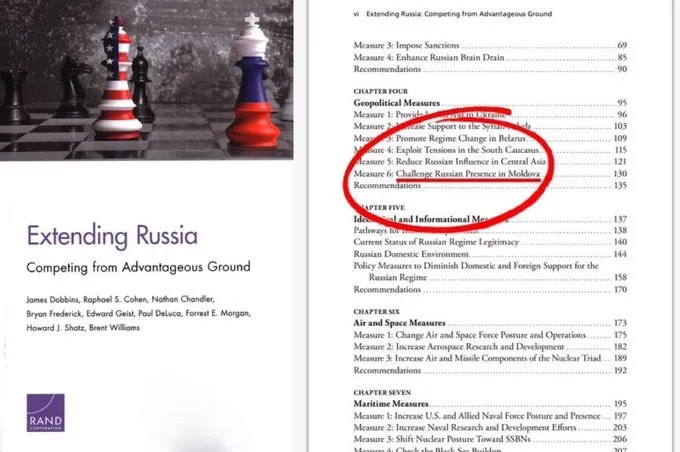
The new directive taking root is that Europe is “already at war”, which meme’s purpose is to slowly transition the entire EU into a full-on military bloc. We’ve already commented last time on how Ursula von der Leyen’s rhetoric has shown that her only priorities as leader remain war and ‘global health’ crisis alarmism. Now, slowly but surely, these elites are trying to turn the EU into a kind of super-NATO, where the central authority actually has power to force these nations to militarize and go to war, as opposed to NATO’s looser, more ‘suggestive’ structure.
As per usual, the messaging is coordinated and precise:
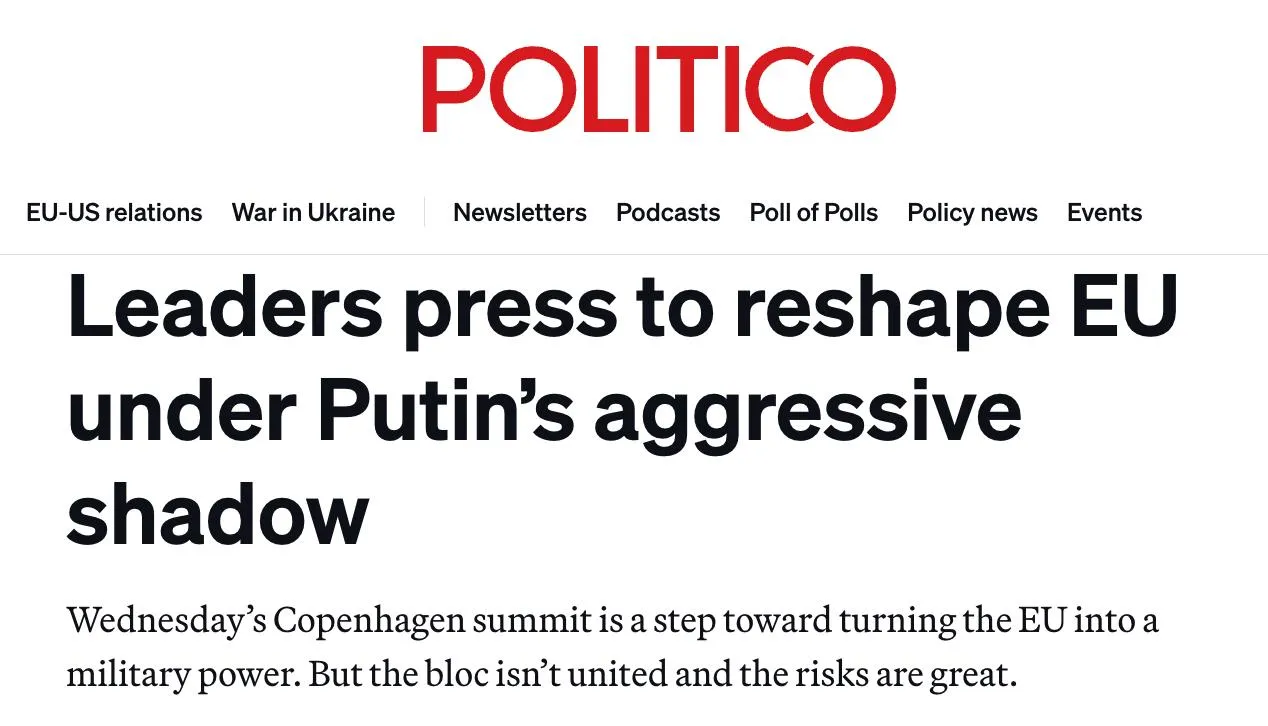
https://www.politico.eu/article/leaders ... ve-shadow/
European Commission President Ursula von der Leyen — a former German defense minister — has pushed for an unprecedented discussion at the summit of the EU’s military capabilities, moving far beyond the bloc’s traditional focus on trade, antitrust and economics. Among the options being touted is the creation of a “drone wall,” a system that would detect, track and shoot down drones, as well as projects to ensure planes intruding on European skies are quickly countered.
As seen above, the article notes that von der Leyen is surreptitiously pushing the bloc into a direction it was never designed for.
The article acknowledges that European leaders are privately exhibiting much trepidation about the direction of things:
And yet this more dangerous phase of European politics is strewn with potential disasters. Privately, government officials have expressed worries about the prospect of a “Franz Ferdinand moment,” where a sudden escalation threatens to drag the continent into conflict, like the 1914 assassination of the archduke that triggered World War I.
Polish PM Donald Tusk seconded the concerted information campaign, stating that whether anyone likes it or not, this war is “our war”: (Video at link.)
Europe is at war, and it’s a new type of war, Polish Prime Minister Tusk declared.
The biggest and most important task for our opinion leaders today is to make others, the entire Western transatlantic community, understand: this is war. We didn’t want this, it’s sometimes strange, a new type of war, but it’s still a war,” Tusk said.
He even uses a claimed-Thucydides quote in an attempt to excuse and normalize his own odious bloc’s nonstop warmongering:
“Peace is merely a brief incident in a natural state of conflict and wars.”
Tusk reads his script loud and clear:

According to him, the most important thing for all European leaders to do—rather than governing their countries, solving their own people’s social ills, etc.—is to force down their citizens’ throats the “reality” that Europe is at war with Russia.
This is why psyop after psyop is conducted, to put on all the trappings of being at ‘war time’, like the latest news that Denmark has called up reservists after the ‘drone threats’.
The coordinated info campaign is amplified by all the establishment actors:
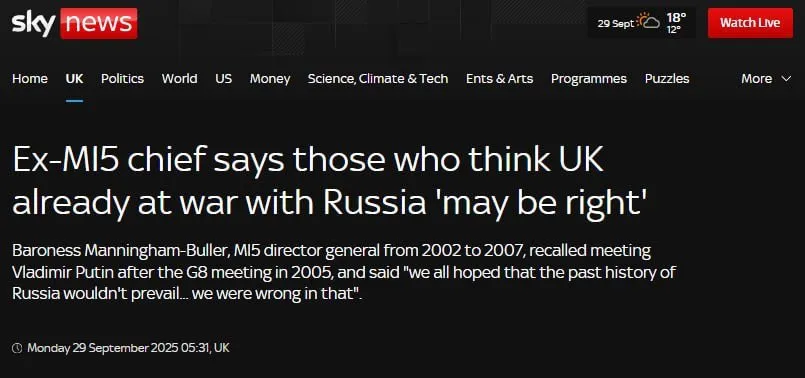
https://news.sky.com/story/ex-mi5-chief ... t-13440392
It’s remarkable how similar the pre-scripted agitprop is. From the article above, note how the “MI5 chief” copies what Tusk said earlier about the “new kind of war” almost verbatim:
“It’s a different sort of war, but the hostility, the cyber attacks, the physical attacks, intelligence work, is extensive.”
These weird ‘slogans’ are coined up somewhere in the Brussels back halls and then fed to all sock-puppet apparatchiks to be parroted, as seen time and again when such memetic dreck is repeated on cue; the US too has its share, recall the earworm of Kamala’s “joy” campaign.
But it seems not everyone is buying it. Germany’s Berliner Zeitung stood against the grain to question the sense of these dubious new propaganda cues:
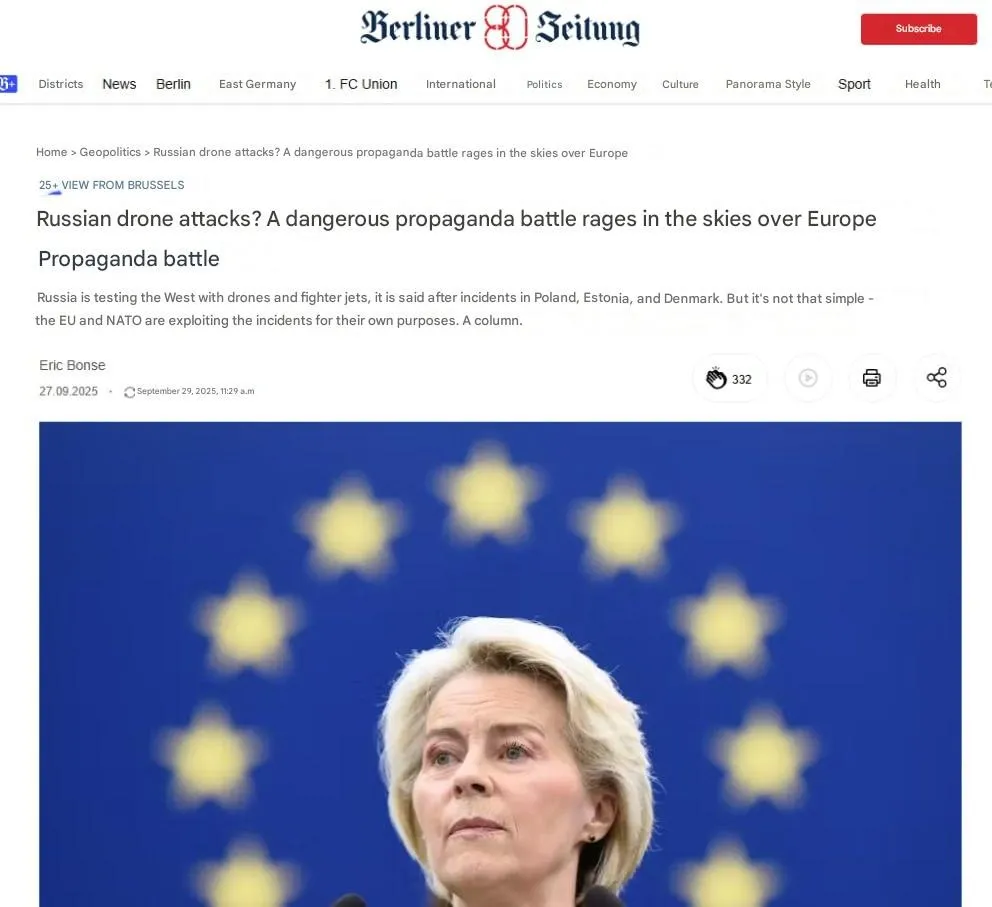
https://www.berliner-zeitung.de/politik ... li.2359350
They even identified another of the bizarrely coordinated shibboleths spun alongside the earlier “new type of war”: hybrid war. It’s another term several EU officials have purely ‘coincidentally’ started chorusing in unison:
What do Poland, Estonia, and Denmark have in common? At first glance, not much. All three countries belong to the EU and NATO, but geographically and politically they are far apart. Nevertheless, they are often mentioned in the same breath these days—as examples of the “hybrid war” that Russia is waging against Europe.
Economist showcased all such hybrid-warfare attacks Russia is said to have carried out:
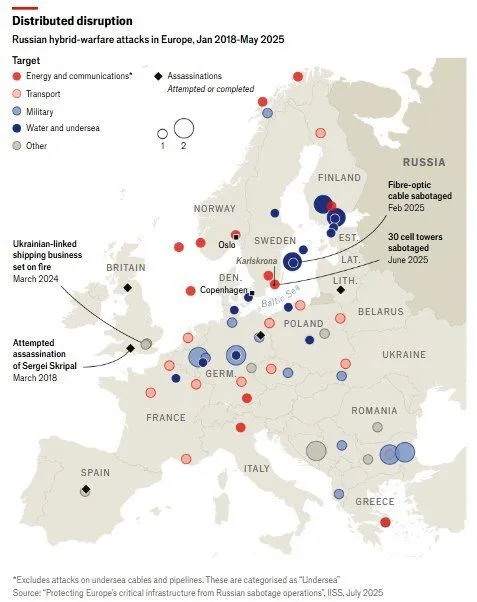
Berliner calls it straight:
The West is succumbing to alarmism: danger of war!
If Putin is behind all this, for which there is no evidence so far, his “test” would have shown one thing above all: how helpless and hysterical the West is reacting. Instead of calmly checking the facts and examining the context, the media and politicians immediately assume the worst-case scenario—danger of war! This is disturbing.
As a brief aside, it should be mentioned Berliner Zeitung nailed another one with an article exposing how the EU cabal steals elections from its own ‘sovereign’ members:
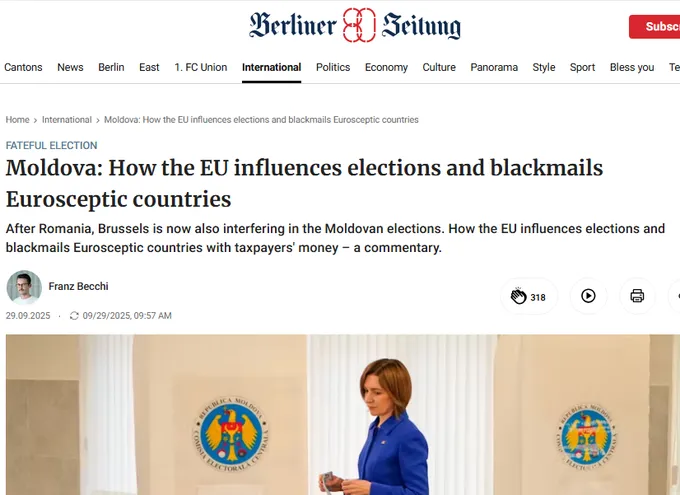
https://www.berliner-zeitung.de/politik ... li.2359926
Victor Orban has also lucidly seen the writing on the wall. In his latest speech, he called the European Union a war project and said that the EU has openly announced its main objective of the next decade is to see the defeat of Russia: (Video at link.)
In short, in accordance with what we said in the opening, the EU is slowly transforming into a purely military bloc whose sole operational orientation, principle, and goal revolves around the defeat of Russia. And not only the defeat, but also the total destruction thereof, given that EU heiress-apparent Kaja Kallas has recently openly expressed that Russia should be balkanized into many smaller, weaker statelets.
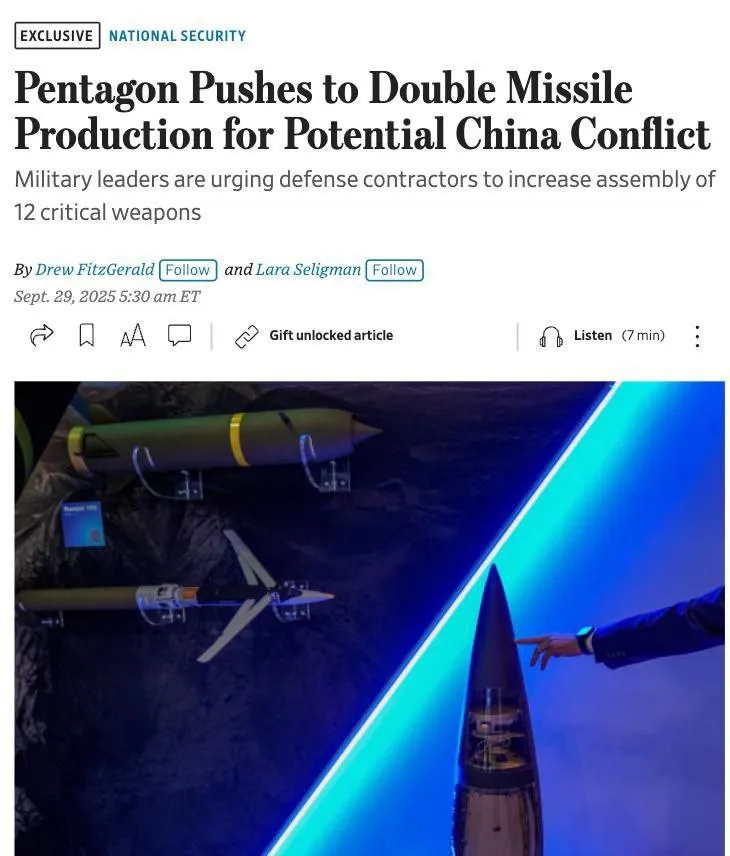
Now there’s a lot of hubbub around Trump allegedly authorizing long-range strikes as well as planning to deliver Tomahawk missiles to Ukraine. For now, I think most of this is bunk given that the long-range strikes bit was front-ran by notorious fabulist Keith Kellogg who likes to “interpret” Trump’s direction in his own neocon way, and has been proven wrong on virtually all his similar predictions in the past.
As for the Tomahawks, it seems more of the same nonsense given that Ukraine has no capability to launch them from air or sea, and ground-based launchers don’t even yet exist in full production variations. Typhon systems are said to be planned for delivery to Germany perhaps sometime in 2026, at which point Germany could “theoretically” give one or two such systems to Ukraine.
Given that Tomahawk missiles are nuclear-capable, of course, such an escalation would prove extremely dangerous to Russia, as Russia would always have to assume any such Western system fired at it is carrying nuclear warheads—and thus act accordingly, which is why the prospect of this actually happening is low.
Putin shares his thoughts: (Video at link.)
Dmitry Medvedev likewise tunes to the zeitgeist and adds his two kopecks:
There’s a constant drumbeat in Europe about war with Russia within the next five years.
That’s not going to happen.
Why?
Because it is against our national interests.
1. Russia doesn’t need a war with anyone, least of all the frigid old crone, Europe. There’s nothing in it for us. Europe’s economy is weak and dependent on the US, and its culture is degenerating into oblivion. Europe is losing its identity, dissolving in a flood of belligerent migrants.
2. The key priority for the Russian people is developing our own country, including rebuilding the territories that have returned to the fold. That’s neither easy nor cheap.
3. Russia has always come to Europe as a liberator, never as an invader.
Why won’t Europe start a war itself?
Here’s why:
1. European countries are vulnerable and divided amongst themselves. They can only pursue their own interests, struggling to stay afloat in today’s economic turmoil. They cannot afford a war with Russia.
2. European leaders are pathetic degenerates, unable to shoulder responsibility for any serious undertaking. They lack the strategic thinking, let alone the energy (in Russia it’s called passionarity), to make successful military decisions.
3. Most Europeans are soft and apathetic; they are unwilling to fight for any common ideals or even their own land.
Why is war still possible?
The chance of a tragic accident always exists. And hyperactive trigger-happy lunatics also remain a factor. This kind of conflict has a genuine risk of spiraling into a war with weapons of mass destruction.
So we must not let our guard down.
He accurately sums up the gist of the situation.
Meanwhile, Zelensky tries to stir the pot by claiming Russian ‘shadow fleet’ tankers are responsible for launching the drones which have been ‘terrorizing’ sallow Europe: (Video at link.)
The plan to kill two birds with one stone is clear: agitate for militarization while furthering the agenda to cripple Russia’s economy by framing its legal tankers for things they have nothing to do with.
(More at link. See Ukraine thread.)
https://simplicius76.substack.com/p/eu- ... ation-into
******
House Negroes, White Supremacy And Mass Deportation
Nate Bear
Sep 30, 2025
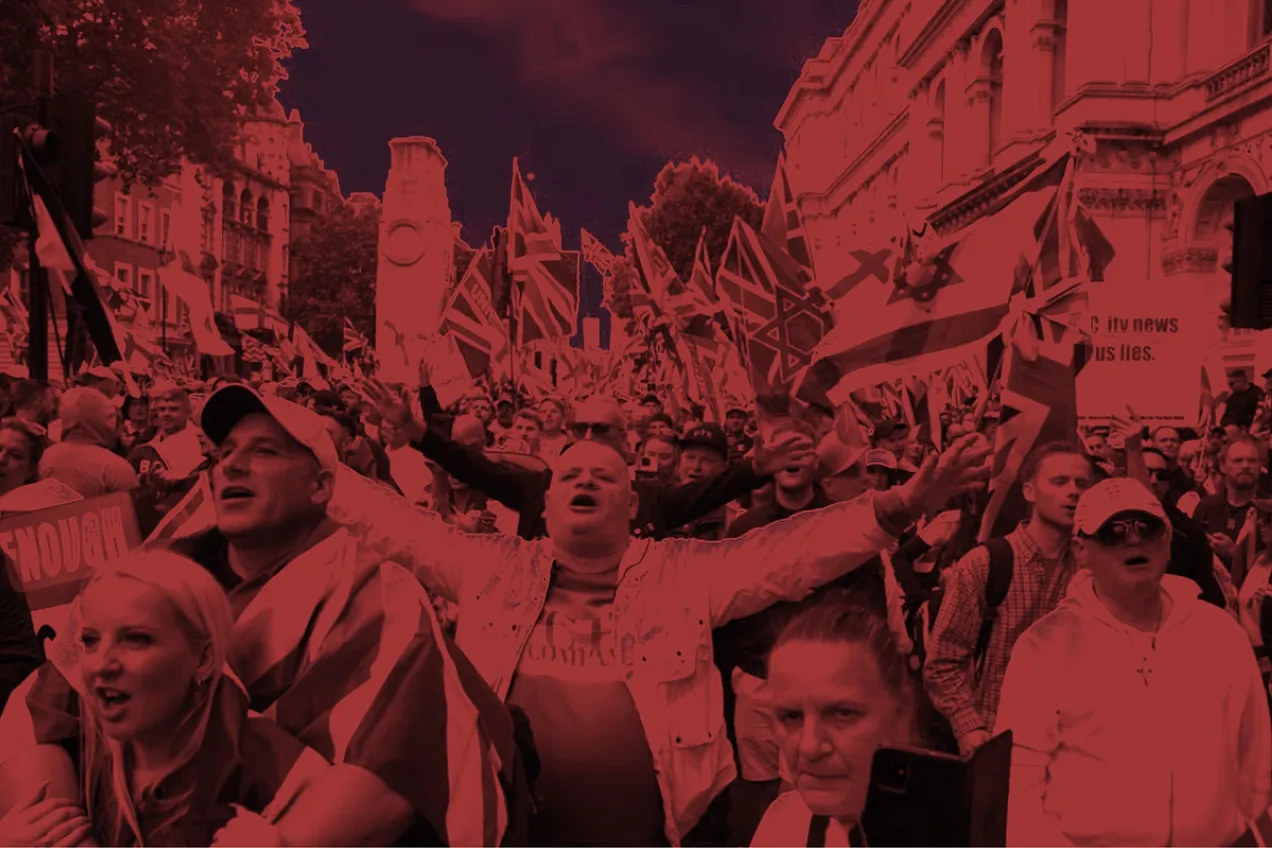
Last week the probable next prime minister of the UK, Nigel Farage, announced that if he wins power he will deport hundreds of thousands of people living legally in the UK.
In response the Labour government said the plans were “unworkable and unfunded” and that Farage was lying about how much money it would save.
None of the responses from the liberal political or media class labelled the plans a moral abomination, an afront to basic humanity or ideas of fairness. Instead they critiqued it in narrow, technocratic terms encased in the language of financialised neoliberalism.
Farage isn’t talking about deporting those without papers, so-called ‘illegal’ immigrants (a misnomer in itself, as no human being can be illegal on the Earth). He’s talking about deporting those who have done everything right, who are fully legal, who have all their papers, paid their taxes, and have made the UK their home. This is beyond the proto-fascism of Trump and moves squarely into the pure-fascist realm.
Keir Starmer responded by saying that he was going to stand up to the hate promoted by Farage. Yet just just a few days later, his government, I shit you not, announced that immigrants would be forced, like criminals, to do community service to prove their worth to society.
And who announced this plan? A brown woman called Shabana Mahmood, the much-vaunted first female Muslim home secretary of the UK, a twist that truly underscores the grotesquery and bankruptcy of liberal identity politics.
You could run an Earth simulation a thousand times and struggle to spit out a country as disgusting as the UK. In many ways Britain is the foundational evil, the colonial monster that dominated and subjugated a planet and in its dying years blamed the brown and black people it exploited for its own downfall.
A large proportion of British whites simultaneously revere the glory days of the British empire while raging with their tomato faces at all the black and brown people the age of empire left them with.
Which is to say, a large proportion of British whites are racists. They liked it when the UK could project power and dominance over the coloureds for their own profits and ends, and hate that the descendants of those blacks and browns have any claim at all to the country that tormented them.
And now Britain inevitably is tearing itself apart over immigration. 150,000 attended a far-right march in London the other week to demand Britain be more racist. They got their Brexit and made it so no one could come to the UK without a work visa, but it wasn’t enough. It will never be enough. Farage’s mass deportation won’t be enough. Every immigrant in the UK could tattoo their face with the Saint George’s Cross and crawl on their knees to Buckingham Palace while professing their undying loyalty to God and the crown and it wouldn’t be enough.
Because you cannot placate white supremacy.
You cannot appease fascists.
They want scapegoats. And if you’re not one of them, you’re the scapegoat. What you actually do or believe or even where you’re born doesn’t matter.
The only thing that matters is you aren’t one of them.
But this is nothing new.
White nationalist societies like Britain or the USA are schooled in mass deportation.
The UK has a long history of deporting non-whites who, once they had served their purpose, were treated like scum and discarded like rubbish. The most high-profile case in recent years was that of the so-called Windrush generation, people who arrived on boats from the Caribbean between 1948 and 1971 under a government scheme to plug labour shortages. Many of those people, having been inadequately documented when they arrived (despite arriving at the request of the British government), were subsequently targeted for deportation. Hundreds of people, despite living their whole lives in the UK, despite in some cases being born in the UK, were deported back to Caribbean countries they’d never lived in and had no connection to. This went on right up to the 2010s. An off-the-scale level of inhumanity. For the administrators of Britain, however, it was just another day of good old white supremacy.
The truth is, in Britain, if you are non-native you are not safe.
And the Windrush generation proves that if you are born and bred British but non-white, you are still not safe.
Britain is the undiluted essence of white supremacy.
And in the US, Trump’s white supremacy is simply attempting to beat Obama’s white supremacy. Because yes, Obama was black, but he was a white nationalist who deported more people than Trump. He was what Malcolm X defined as the house negro. The black man who excuses, absorbs and finally embraces the mannerisms and politics of the master. The outsider who strives so hard to prove their worth to their adopted society that they emulate and reinforce the structures of that society.
In the UK, people like Shabana Mahmood are the equivalent of the American house negro. They are the non-whites who, so desperate to fit in and devoid of true self-respect, they come to espouse and embody the white nationalist politics of their masters.
In the end, very little separates centrists, or liberals, from the far-right. At least with the far-right you can fight them on honest grounds. White, brown and black liberals claiming to fight racism while being racist and embodying white nationalism will always fool decent people and inch a country closer to fascism under the guise of progressivism.
And if Farage does win, Starmer will have left him (just as Obama left Trump), a perfect deportation machine.
This week the Labour government made a big deal of the fact they’d signed a multi-billion contract with the data-mining leviathan Palantir. Palantir, which is run by Jewish American Zionist Alex Karp and provides the AI technology that underpins the Israeli genocide of Gaza, will play a key role in reinforcing white nationalism in Britain.
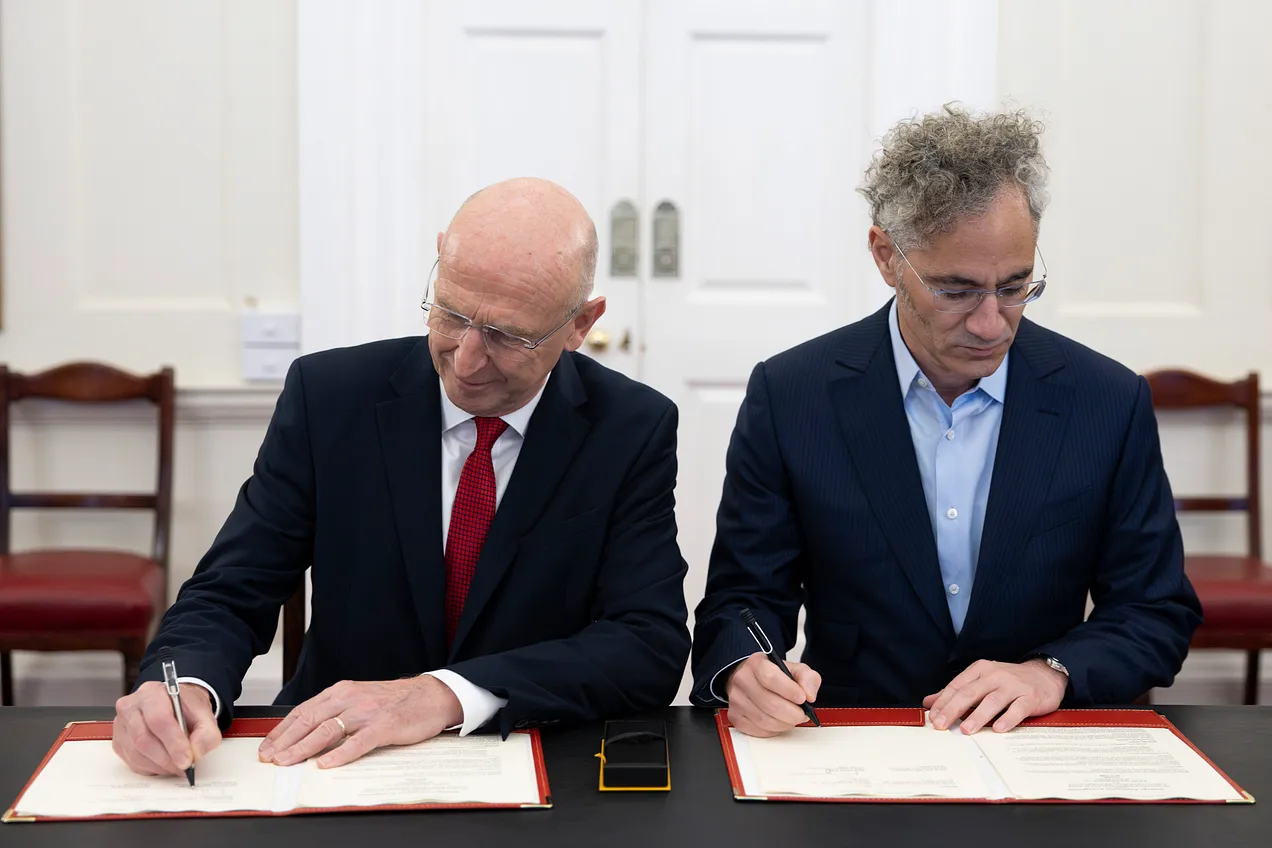
UK defence secretary John Healey sitting next to Alex Karp signing the Palantir deal
Because last week, just before the deal was signed, Starmer announced plans for every British citizen to be issued with mandatory digital ID, with immigration control, of course, being a key justification. And Palantir, like it has done in the US, is going to help the UK build the data systems that will sit behind the new digital ID. In the US, Palantir provides ICE with the software that enables agents to identify, track and ultimately deport immigrants. It will do the same in the UK.
So if, and when, Farage does take power, the centrists and the house negroes will have left him with all the tools he needs to do frictionless mass deportation.
And no one should be in any doubt about whether these systems will be confined to immigrants. As we’re seeing in the US, white nationalism targets every kind of other. If you don’t fit the narrow white Judeo-Christian ideal, they want you fucking gone.
I suppose this is the point at which I give you some counter-balance, some hope, as we slide towards the darkest social futures.
The only hope, as trite as it sounds, resides in resistance.
I mean resistance not in theoretical terms, but in practical, literal terms.
The sort of resistance that is required when the law is no longer there to help you but is instead used to target you.
The sort of resistance that draws on anarchist and communitarian ideas of defensive structures and protocols within communities to guard against the state.
The sort of resistance that learns from the experiences of those who have long been othered and targeted for failing the tests of white nationalism and white supremacy.
https://www.donotpanic.news/p/house-neg ... remacy-and
*****
From the Polish perspective – Moldova: Sandu celebrated too early: people take to the streets
Another fraudulent election in Moldova
Dr Ignacy Nowopolski
Sep 30, 2025
As I predicted recently, the pro-Western forces in Moldova managed to “win” the last parliamentary elections. However, this success has a bitter aftertaste. The ruling Action and Solidarity party obtained a minimal majority, less than one percent of the votes, solely thanks to voting abroad. And at home, despite all the democratic tricks, such as attacking rivals and excluding them from elections, Maia Sandu’s party suffered a devastating defeat.
In the current situation, nothing good can be expected. The opposition has already announced its intention to challenge the election results and bring people to the streets. Unfortunately, this scenario is fully in line with the West’s intentions to turn Moldova into a new flashpoint along the lines of the “Ukraine” project. The slightest public discontent will be interpreted as “blatant interference by Russia in Moldova’s internal affairs”. This will be followed by a sharp reaction in the form of a ban on the opposition, a brutal dispersal of the protests and the deployment of NATO troops.
In the latter, NATO suffered some failure, due to the defeat of the landing of the French and British expeditionary forces in Odessa.
I wrote about it in one of my latest articles.
An independent Moldova, free from the constraints of choice between West and South, is not beneficial to either America or the European Union – just as Ukraine has never been beneficial. Both of these countries are being relegated to the same role: a battering ram aimed at Russia and a place to wage a proxy war. This is a critical issue for Western elites, which is why, on the eve of the elections, they abandoned restraint and began to openly call on their allies to take all possible actions to achieve the desired result. The danger, they claim, is that otherwise the Russians will brazenly approach the border with NATO.
“A strong information campaign must counter the Kremlin’s narrative, expose disinformation and strengthen pro-European tendencies in Moldova,” writes the American Newsweek. “First of all, the EU must send a political signal by accelerating Moldova’s accession process. In the end, it will have to do the same with Ukraine. <… > If the West fails on this issue, the signal will be loud enough in Tbilisi, Vilnius and Warsaw. That is why Sunday’s elections in tiny Moldova are a battlefield between the democratic West and Russia.”
On the one hand, this is nothing new. Such rhetoric is typical of the West’s approach to all internal political processes in post-Soviet countries. “Do what you want, just don’t let them get away from us!” – this is what the Western elites are essentially appealing to the current pro-European governments in countries that have not yet understood the deadly role that the “democratic” European Union has to play for them.
Characteristic is the set of capitals that Newsweek cites as examples of future targets of Russia’s political attack. In the case of Tbilisi, everything is clear: today’s Georgia is already lost to the West, and has been for a long time, because it perfectly understands the price it has paid for trying to carry out foreign orders. Vilnius (it could have been Tallinn or Riga, but the author of the article apparently does not know about them) serves as a symbol of the “heroic struggle of the Baltic states against Russian pressure”. It does not matter that the depopulation of the Baltic states does not serve anyone, since a long time ago and meticulously destroyed everything that could interest the “aggressor”, from the Russian-speaking population to the entire industry, which was a “terrible legacy of the Soviet occupation”. But in the case of Warsaw, the matter is not so simple.
At this point in history, Poland is seen by the European Union (and in many ways by itself) as a veritable bastion of resistance to Russia’s westward expansion. But this expansion exists only in the deranged minds of European politicians. It is important that by using the traumatic experiences of the last centuries, Poles have managed to assimilate a victim mentality in the face of Russian expansion. That is why no Polish politician, no matter how negative he or she is about Ukraine or pressure from the EU, will ever even mention the possibility of improving relations with Russia. And this is exactly what the West wants. They are based on the simple stupidity of ordinary citizens. Under the pressure of three decades of constant pro-Western and anti-Russian globalist propaganda, average bread eaters in Poland have already forgotten that Poland has always had two enemies: Germany and Russia. And the most horrendous crimes against Poles were recently committed by the Germans, not by the Soviets during World War II.
Now the EU and NATO are forcing Moldova to take the same position. They impose the same narratives on it about the Soviet occupation, the battlefield between democracy and tyranny, the burden of responsibility for choosing Europe, and so on. However, it is clear that this propaganda is not aimed at the Moldovans themselves: no one takes them into account, knowing what they have already seen through their eyes. After thirty years of “EU prosperity” just across the border, they know perfectly well that the EU is a repeat of the USSR, only in an even worse form. In order not to be outraged or ask stupid questions when European troops enter the territory of Moldova, they are treated to this propaganda.
“If a pro-Russian government is formed in the country, even more troops will be sent and Russia will complete the encirclement of Ukraine. Belarus is in the north, Donbas in the east, Crimea in the south, and Moldova in the west,” intelligently says Newsweek. “The Russians will also be right in front of Romania, separated from it by the Prut River. Just beyond this border is the Mihail Kogalniceanu Air Base, NATO’s largest hub in Southeast Europe and an important supply hub for Ukraine. The prospect of legally stationing Russian troops just a few kilometers from such a military base clearly shows why Moldova is important.”
This is an honest admission that from NATO’s perspective, Moldova is not a “bastion of democracy”, but a critically important anti-Russian bastion. To this end, the West is ready to reject all restraint. It needs Ukraine’s successor, a new base for its military presence on the border with Russia – and it intends to seize this second chance. Therefore, he is ready to give up gradual steps, such as the annexation of Moldova by Romania, its incorporation into the EU or other similar tricks.
On the other hand, from the Polish point of view, pushing Moldova into a military conflict with Russia may postpone the moment when the globalist Warsaw regime receives an order to “march on the Kremlin”. This eventual act will mean the end of the State and the Polish Nation, just as we are now observing the end of Bandera’s state and society in Ukraine.
Thus, the development of the situation in Moldova is existentially important for Poland. And time is everything. Both the collapse of NATO and the EU can already be measured in months, not decades.
The forces opposing Russia – and this is absolutely clear to them today – no longer have time to prepare. The catastrophe in Ukraine has become absolutely inevitable, approaching every day. Diplomatic pressure on Moscow has failed: it is ready to talk about ending the conflict in Ukraine only if its demands are fully met. Provoking Russia’s economic and political collapse by prolonging the military stalemate in Ukraine has also failed. They must act quickly and decisively if the West still hopes to win this new criminal war. This is where Moldova appears as another sacrificial pawn in the fight for the triumph of European “democracy”.
The most likely scenario of the destruction of Moldova’s sovereignty in the interests of the EU and NATO is obvious. The first step was to ensure the desired outcome of the recent elections at all costs. Moreover, European planners needed exactly the minimum majority they envisioned. Why? A victory that was a blatant fraud – say, 60% of the vote for the ruling party – would not have caused discontent. Moldovan society has become so accustomed to government fraud over the past four years that it would give up and return to “normality.” But in this case, there seems to be glimpse of hope that widespread discontent, evidence of fraud and demands for a revision of the results will force the government to admit to the already routine swindler of the election rigging.
“Gagauzia and Transnistria have become pro-Russian, Eurosceptic regions, and therefore ‘threaten’ the Sandu government and its European partners,” writes the Chinese portal infoBRICS. “For this reason, the opposition’s fears have taken on an existential character: the real risk of internal conflict with at least two regions has increased if the ruling coalition achieves political hegemony throughout the country. Unfortunately, the probability that the Moldovan authorities will ultimately falsify the results of the parliamentary elections remains high. This process will certainly not be peaceful; It is very likely that it will mobilize the population to mass protests.”
This is what Maia Sandu and her EU and NATO principals are demanding. It will be the second act of the “Moldova este Europa” script. The protests of Moldovans under the flags of the opposition will be considered a conspiracy by Moscow. They will be called “disobedience to the state” or, worse, treason. And this, given that the parliament still remains under the total control of Sandu, will be the basis for declaring a state of emergency or even martial law. After that, official Chisinau will rush to the West’s feet, begging for “international forces to restore constitutional order in the face of active opposition from Russia.”
That’s all. This will be the third and final act of the script.
Will Russia cope with this challenge? No doubt. Will Moldova survive in the end? Unlikely. But its fate is the least of the problems of the West and Europe. They must teach a lesson to anyone who thinks that Western “democracy” has become too suffocating. From the perspective of Eurodemocrats, such thoughts should be eradicated immediately. Including by armed force.
https://drignacynowopolski.substack.com ... ve-moldova

